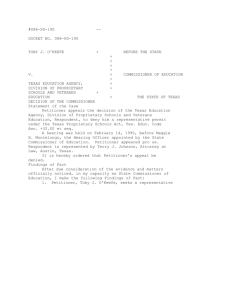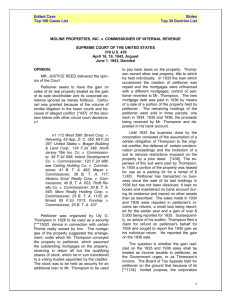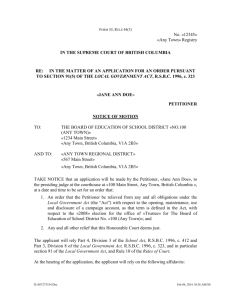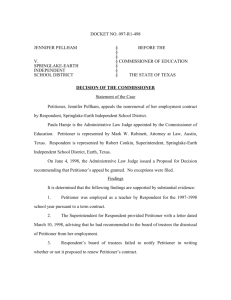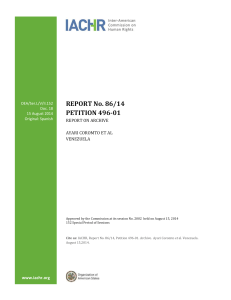DOCKET NO. 215-R3-885 LAURA RICHTER § BEFORE THE
advertisement
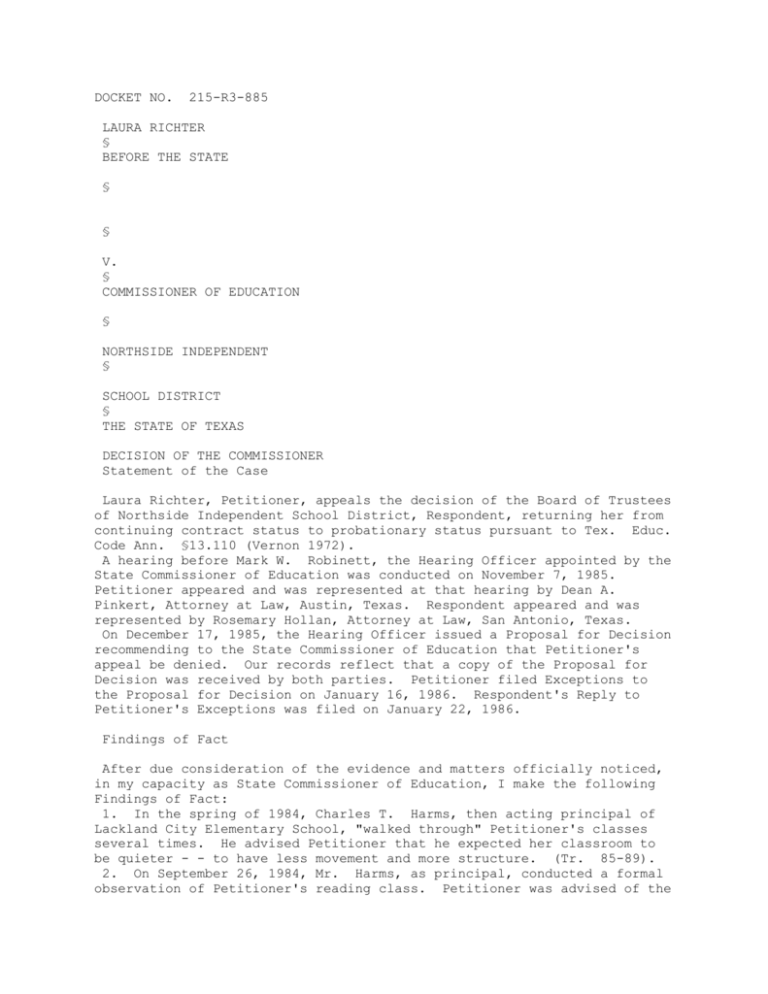
DOCKET NO. 215-R3-885 LAURA RICHTER § BEFORE THE STATE § § V. § COMMISSIONER OF EDUCATION § NORTHSIDE INDEPENDENT § SCHOOL DISTRICT § THE STATE OF TEXAS DECISION OF THE COMMISSIONER Statement of the Case Laura Richter, Petitioner, appeals the decision of the Board of Trustees of Northside Independent School District, Respondent, returning her from continuing contract status to probationary status pursuant to Tex. Educ. Code Ann. §13.110 (Vernon 1972). A hearing before Mark W. Robinett, the Hearing Officer appointed by the State Commissioner of Education was conducted on November 7, 1985. Petitioner appeared and was represented at that hearing by Dean A. Pinkert, Attorney at Law, Austin, Texas. Respondent appeared and was represented by Rosemary Hollan, Attorney at Law, San Antonio, Texas. On December 17, 1985, the Hearing Officer issued a Proposal for Decision recommending to the State Commissioner of Education that Petitioner's appeal be denied. Our records reflect that a copy of the Proposal for Decision was received by both parties. Petitioner filed Exceptions to the Proposal for Decision on January 16, 1986. Respondent's Reply to Petitioner's Exceptions was filed on January 22, 1986. Findings of Fact After due consideration of the evidence and matters officially noticed, in my capacity as State Commissioner of Education, I make the following Findings of Fact: 1. In the spring of 1984, Charles T. Harms, then acting principal of Lackland City Elementary School, "walked through" Petitioner's classes several times. He advised Petitioner that he expected her classroom to be quieter - - to have less movement and more structure. (Tr. 85-89). 2. On September 26, 1984, Mr. Harms, as principal, conducted a formal observation of Petitioner's reading class. Petitioner was advised of the observation in advance. Petitioner's lesson was not effective. It did not follow the lesson plan, and no "real instruction" took place. In the section on the observation form for "summary comments and recommendation," the principal noted the following: 1. Lesson Plans - Lesson plans are only a guide, but should state objective and procedure to be followed. 2. Skill sheets (Ditto) - Skills must be taught or reviewed before passing out dittos. Dittos should be related, not 3 separate skills at one time. 3. Room - Needs organization, removal of excess materials. many items get stuck on ceiling? How did so 4. Classroom Management - Post new set of class rules and consequences. Principal Harms discussed what he observed with Petitioner at a post observation conference on September 28, 1984. (Tr. 88-92; Resp. Exs. 1 and 7). 3. On October 24, 1984, Principal Harms conducted an unannounced observation. He observed that the "anticipatory set" was missing; i.e., the lesson was started without any attempt to prepare the students for receiving that day's instruction. Again, there was no "real teaching," no "real demonstration of the desired skill." For example, the principal noted in his comments to Petitioner, she could give examples of size relationships - - such as comparing a wallet size photograph to a five by seven inch photo to demonstrate the concepts of larger and smaller, or comparing a yardstick to a ruler to demonstrate long and short. Further, he observed a lot of disruptive movement by students getting up to get materials or waiting for Petitioner to check their assignments. In the section for summary comments and recommendation, he wrote the following: Lesson effectiveness was minimal. Suggestions: 1. Observed a lot of movement, students going back and forth to get basal readers, workbooks, dittos. Expand on instructions at start of lesson, have students get all materials needed. 2. Add anticipatory set to all lessons - Get their attention. 3. Expand on instruction, go beyond reading from workbook/ditto sheets. Principal Harms discussed his observations with Petitioner at a post observation conference on October 25, 1984. (Tr. 93-95; Resp. Exs. 2 and 7). 4. On November 30, 1984, Principal Harms conducted an announced observation of Petitioner. He observed that classroom management had improved and the instructional process was followed. On the observation form, the principal made comments such as, "Well planned lesson," "Classroom management was effective," and, "An effective lesson." The only signifcant negative observation was that Petitioner failed to use any positive reinforcement techniques. (Tr. 95-96; Resp. Exs. 3 and 7). 5. On January 16, 1985, Principal Harms conducted an unannounced observation of Petitioner. He observed that no anticipatory set was employed, no "real instruction" took place, the workbook pages that were passed out covering "Main Ideas," "Map Skills," and "Figures of Speech" were unrelated to each other, a great deal of time was wasted getting materials to students, and many students did not know what they were supposed to be doing. In the category of "Classroom/Student Management," he wrote the following: "Recommendation - - write each group's assignment on the board to eliminate confusion. Assignment would include the gathering of all materials before the lesson starts." Principal Harms discussed his observations with Petitioner at a post observation conference on January 17, 1985. (Tr. 96-98; Resp. Exs. 4 and 7). 6. Principal Harms requested Nora Forester and Joel Friedman to observe Petitioner. (Tr. 102). The principal did not advise either individual of the nature of the problems he perceived Petitioner as having or of any specific problems to look for. (Tr. 103, 165, 186). 7. On January 28, 1985, Nora Forester, reading coordinator for the school district, observed Petitioner's reading class. This observation was announced in advance. She observed that Petitioner did not introduce the lesson. Petitioner did not introduce vocabulary and she did not introduce skills (i.e., she did not "direct teach"). Petitioner merely said, "Today we're going to read." Ms. Forester also observed Petitioner's students moving around freely and not "staying on task," because they did not have enough seat work. Petitioner ignored this behavior and did not correct it. (Tr. 187-88). On January 29, 1985, Ms. Forester had a post observation conference with Petitioner, at which time she suggested that Petitioner's students would be better behaved if they had more meaningful seat work. (Tr. 189). At the end of the observation conference, Ms. Forester suggested that Petitioner phone her, because she would be glad to work with Petitioner some more or help in any way. (Tr. 190). Petitioner did not call. (Tr. 190). 8. On February 7, 1985, Mr. Friedman, the district's Elementary Science Supervisor, observed Petitioner's math class. He observed deficiencies in the areas of instructional process and classroom management. Among the things he noted were that Petitioner did not utilize an anticipatory set, did not engage in any "direct teaching" (i.e., modeling and showing the skills being covered), and ignored minor disruptive behavior. (Tr. 164-68, 182; Resp. Ex. 8). Immediately following the observation, Petitioner explained to Mr. Friedman that she would be out of the building and unavailable to have a conference. They did, however, have a brief conversation concerning her lesson. (Tr. 166-67). 9. On February 26, 1985, Principal Harms conducted an announced observation of Petitioner. He observed that the students were not told the objective or purpose of the lesson, they were not given adequate directions, and no positive reinforcements were used. In his summary comments and recommendations, the principal wrote the following: Lesson still inefective (sic) Classroom management has improved. 1. Select words for ABC order and definition from mastery words in T.E. 2. Always state objective of lesson in "kid talk." 3. Try to use positive reinforcements. 4. Modify consequences, need to be more meaningful to students. Principal Harms discussed his observations with Petitioner at a post observation conference on March 1, 1985. (Tr. 99-102; Resp. Exs. 5 and 7). 10. By letter dated March 27, 1985, Jack C. Jordan, Superintendent of Northside ISD, advised Petitioner that he had recommended to the Board of Trustees that Petitioner be returned to probationary contract status at the end of the school year. The reasons given for the proposed action were: . Incompetence in performance of duties . For good cause as determined by the local school board, good cause being failure of a teacher to meet the accepted standards of conduct for the profession as generally recognized and applied in similarly situated school districts throughout Texas. (Resp. Ex. 11). 11. On April 3, 1985, Ms. Forester called Petitioner to see if she could help Petitioner. Petitioner was reluctant to have Ms. Forester come out, stating that, with only six weeks left in the school year, she could not see where it would help. She stated that she did not want Ms. Forester to observe her. However, she did ultimately agree to meet with Ms. Forester. On April 11, 1985, the two met and discussed some of the problems Petitioner had been having. At that time, Petitioner agreed to allow Ms. Forester to observe her again on April 18, 1985. (Tr. 19091). 12. On April 18, 1985, Ms. Forester observed no anticipatory set, no objectives and purposes were stated by Petitioner at the lesson's outset, and no direct teaching took place. The students were misbehaving, but they were better than during Ms. Forester's previous visit; however, there were only seven students in the room during the lesson, compared to twenty-one or twenty-two students previously. (Tr. 192-93; Resp. Ex. 10). Ultimate Finding of Fact In my capacity as State Commissioner of Education, I make the following Ultimate Finding of Fact: Petitioner failed to perform her assigned duties competently during the 1984-85 school year. (Findings of Fact Nos. 1-9, 12; Tr. 161-62, 18183, 207-08) Discussion The evidence in this cause, which includes evaluations of Petitioner from prior years (Pet. Exs. 2, 9, and 10), suggests that Petitioner has the ability to be a good teacher. The evidence also demonstrates, however, that Petitioner did not perform her duties competently during the 1984-85 school year. She did present an effective lesson during one observation, and six of the eight observations contained positive marks in a majority of the areas covered by the observation form. However, the same significant problems were noted consistently by three independent observers; i.e., her failure to adequately prepare her students for instruction, to engage in direct teaching, to give clear instructions, to keep her students from moving around, and to keep her students under control. Petitioner's argument, aside from her contention that she did perform her duties competently, is that the school district may not reduce her to probationary status because it did not adequately counsel her about her perceived deficiencies and place her on an improvement program including specific recommendations for improvement, specific activities to accomplish improvement, and specific time lines for the teacher to have that improvement observed. (Tr. 237). She contends that the Decision in Tyler v. Galveston ISD, No. 132-R1b-783, p. 19 (Comm. Educ., Nov. 1984), is applicable. In that decision the Commissioner writes that before a school district may dismiss [or demote] a teacher [with continuing contract status], who has ostensibly been a competent and valued employee of the district for a number of years, it must make a bona fide effort to assist the teacher in correcting deficiencies which the teacher could reasonably be expected to overcome. The question in the present case concerns exactly what a school district must do to constitute a bona fide effort to assist a teacher. The Tyler decision states, at pp. 20-21, that, prior to reduction to probationary status, a teacher must be specifically advised of objectionable conduct which the teacher can be reasonably expected to correct, and must be given a legitimate opportunity to conform his or her conduct accordingly. . . . If a teacher is deemed competent enough to be given a continuing contract, the fact that deficiencies are later identified in the teacher's performance does not justify demotion or termination in the absence of a showing that the teacher has been advised of the deficiencies and either cannot or will not overcome them. What the district must do, under this rationale, is clearly advise a teacher of his or her perceived deficiencies and allow the teacher a reasonable opportunity to correct them. Although recommending specific activities and stating specific time lines is commendable, it is not required. The district may assume that the teacher, as a professional, will know what steps are necessary to correct deficiencies that are brought to his or her attention or will make an effort to find out, either from those in the district with expertise in such matters (including, for example, the school's principal, other teachers, or the district's chief administrative officer in a particular subject area), or from some other source. Naturally, the school district's personnel should cooperate with any teacher who requests assistance concerning how to correct his or her deficiencies; however, it is the teacher, as a professional, who should decide whether such assistance is necessary and will be helpful in a particular matter. As long as the teacher is clearly advised of the deficiencies which must be corrected and given a reasonable opportunity to overcome them, the fact that the district does not initiate an improvement plan with specific recommendations, personal activities, and time lines for demonstrating improvement, should not result in a reversal of its determination to reduce a teacher to probationary status for failing to correct his or her deficiencies. In the present case, Petitioner's perceived deficiencies were clearly communicated to her on a number of occasions, and she was given a reasonable opportunity to correct them. Mr. Harms did make suggestions for improvement in certain areas, and Ms. Forester made a specific offer to assist Petitioner, an offer of which Petitioner failed to take advantage. Under these circumstances, it must be concluded that the school district made a bona fide effort to assist Petitioner in correcting her deficiencies, and she failed to correct them. The Board of Trustees' decision to reduce Petitioner to probationary contract status should be affirmed. Conclusions of Law After due consideration of the record, matters officially noticed, and the foregoing Findings of Fact, in my capacity as State Commissioner of Education, I make the following Conclusions of Law: 1. Petitioner's failure to perform her assigned duties competently during the 1984-85 school year constituted good cause for the Board of Trustees of Northside ISD to reduce her to probationary contract status. 2. Petitioner received adequate notice of her deficiencies and a reasonable opportunity to correct them prior to the Board's decision to reduce her to probationary contract status. 3. Petitioner's appeal should be DENIED. O R D E R After due consideration of the record, matters officially noticed, and the foregoing Findings of Fact and Conclusions of Law, in my capacity as State Commissioner of Education, it is hereby ORDERED that Petitioner's appeal be, and is hereby, DENIED. SIGNED AND ENTERED this 6th day of June, 1986. _______________________ W. N. KIRBY COMMISSIONER OF EDUCATION DOCKET NO. 215-R3-885 LAURA RICHTER § BEFORE THE STATE § § V. § COMMISSIONER OF EDUCATION § § NORTHSIDE INDEPENDENT § SCHOOL DISTRICT § THE STATE OF TEXAS ORDER DENYING MOTION FOR REHEARING BE IT KNOWN that on this date came on for consideration Petitioner's Motion for Rehearing in the above-styled and numbered matter; and, after due consideration, it is accordingly ORDERED that Petitioner's motion be, and is hereby, DENIED. SIGNED AND ENTERED the 21st day of July, 1986. _______________________ W. N. KIRBY COMMISSIONER OF EDUCATION 2 #215-R3-885



